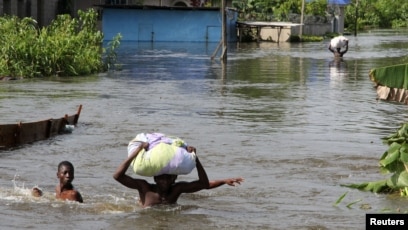The Nigeria Hydrological Services Agency (NIHSA) has urgently called for residents along the banks of the River Niger and River Benue to relocate to safer areas. This warning comes amid alarming increases in water levels, which have now reached critical thresholds.
In a statement released on Friday, NIHSA's Director General, Umar Mohammed, underscored the importance of heeding these warnings. He urged citizens to take preventive measures, such as clearing drainage systems and gutters, to facilitate water runoff and mitigate flooding risks.
Mohammed highlighted that the recent heavy rainfall has led to devastating flash floods across the nation, further compounding the urgency of the situation. He reassured the public that NIHSA is committed to its mandate of managing the country’s water resources. The agency will continue daily monitoring of major rivers and tributaries, issuing timely flood warnings and predictions to protect lives and property.
“NIHSA is actively collaborating with emergency response agencies and the media to enhance public awareness and preparedness. Our collective efforts aim to minimize the impact of floods, improve food security, and promote resilience across communities,” the statement added.
The situation in Niger State has turned tragic, with recent floods claiming the lives of 11 individuals and wreaking havoc across 19 of the 25 local government areas. Floodwaters have devastated approximately 118,692 acres of farmland, leaving countless residents without their primary source of livelihood.
In addition to agricultural losses, the floods have severely disrupted education, affecting 246 schools and impacting 529 communities. A total of 34 communities have been directly impacted, with 41,192 individuals in urgent need of relief assistance.
Local government areas facing the worst of the disaster include Mokwa, Katcha, Lavun, Lapai, Agaie, Shiroro, Munya, Gbako, Kontagora, Bosso, Edati, Agwara, Bida, Magama, Mashegu, Borgu, Gurara, Suleja, and Rijau.
Niger State Emergency Management Agency (NSEMA) Director General, Abdullahi Baba-Arah, confirmed the scale of destruction, stating that over 6,865 households have been affected. The floods have also devastated critical infrastructure, destroying 18 bridges and 80 culverts, which has significantly hampered transportation and relief efforts.
This catastrophic event follows earlier warnings from the federal government. On April 17, authorities cautioned that 148 local government areas across 31 states, including Niger, were at heightened risk of severe flooding from April to November.
As the situation evolves, the need for immediate action and community resilience has never been more critical. Residents are urged to prioritize their safety and follow the guidance of local authorities.




